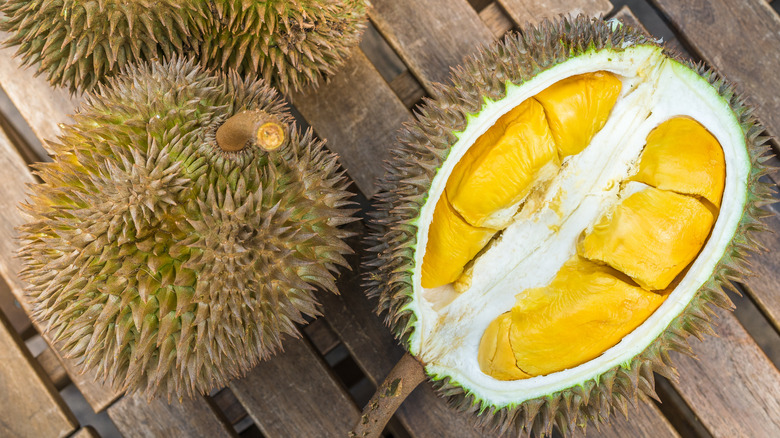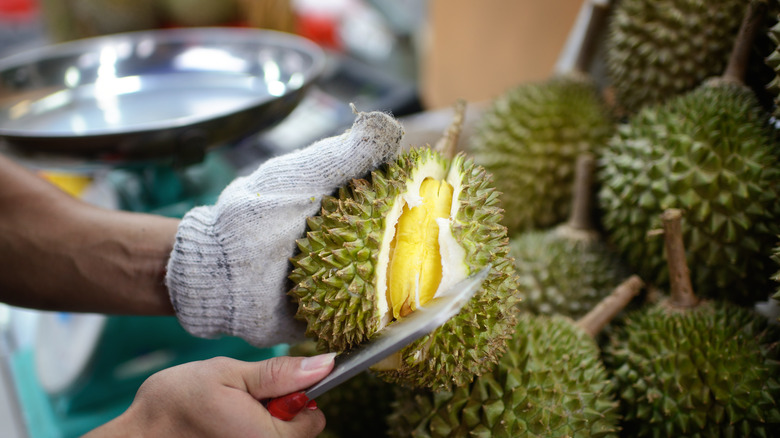The Fruit So Smelly It's Banned On Public Transportation
Few foods on the planet have an aroma as contentious as that of durian, a large, spiky, oblong fruit native to Southeast Asia. You either love it or hate it, and those in the latter camp employ words like "rank," "putrefaction," and "raw sewage" when explaining its unique olfactory qualities. A quote attributed to Julia Child described durian as "dead babies mixed with strawberries and Camembert" (via The Wall Street Journal). It doesn't get more vivid than that (though it can get less complimentary, believe it or not).
Why does durian have such a powerful stink? An article published in Nature hypothesizes that the fruit's smell functions as a loud-and-clear announcement of its presence to attract pollinators, like bats and elephants. As for what gives ripe durian its otherworldly odor, blame (or thank) the presence of an amino acid called ethionine, which is broken down by an enzyme into ethanethiol and its derivatives: the primary odorants responsible for the fruit's pungent smell.
Despite its polarizing smell, durian has legions of fans, but you won't find them eating it in enclosed public spaces. Durian's odor is so pervasive that it's banned on public transportation and in some hotels throughout Southeast Asia, including in Japan, Hong Kong, Thailand, and Singapore. Signs proclaiming "No Durians" might make fun pics for tourists to snap, but it can get serious if you break the rules. Eat durian in a Singaporean hotel room, for instance, and you could land a fine of nearly $400 USD.
Why do some people like durian?
Considering the fruit's infamous odor, you might wonder how anyone could enjoy eating durian. The answer is simple: If you possess whatever gustatory makeup it takes to enjoy it, durian tastes better than it smells — if it even smells bad to you in the first place. Stinky cheeses, for instance, can both smell and taste delightful to their fans. A famous saying in Southeast Asia sums up this taste-versus-aroma effect succinctly. The "king of fruits" — as durian is nicknamed in its home regions – "tastes like heaven and smells like hell," per USA Today's Kevin Farrell.
Yes, "heaven" is a powerful descriptor, and there's a scientific reason durian's flavor is capable of earning such glowing accolades. In addition to its rotten-onion-esque odorants, the fruit's flesh contains a number of chemicals that mimic pleasant smells and flavors, among them honey, fruit, and caramel. Durian's custard-like pulp is also generally rich and sweet, with 13 grams of fat per cup and a sugar content estimated at between 3.1 and 19.97 grams per 100-gram serving, depending on the variety.
The custard-like texture also differs between varieties, of which there are hundreds in Indonesia, Thailand, and Malaysia alone. Some durians are mildly sweet, while others are less so and offer a hint of pleasant bitterness. Some are even tinged with alcohol-like properties. It's a complex fruit, to say the least, and its lack of straightforwardness can inspire as much love as hate.
Buying and eating durian
Durian is a summer fruit, so look out for it from June to August. Even then, it isn't the easiest food to find in the United States. Asian markets are where you'll most likely see it; it's often sold frozen. Fresh durian has been spotted in Costcos in California — tightly sealed, of course. Online tropical fruit websites are another way to obtain fresh durian if you're not in the mood for a Costco shopping treasure hunt. If it's out of season, or if the variety you're looking for is sold out, pre-order may be available.
So what do you do with durian? At the most basic level, you could simply pick up a lobe and bite into it — just remember there's a seed in the center. But durian is also at home in a wide variety of desserts. If you've got durian in your kitchen, durian ice cream or durian pastries are on the table. Savory dishes are possible, too. Pizza Huts in China have been known to serve durian pizza. An added bonus (or drawback) of this application is that the strong aroma and flavor of the fruit are toned down when accompanied by the crust and cheese.
If you do get your hands on a whole, fresh durian, make sure to wear thick mitts or gloves to save your hands from the spikes. And be nice — don't cut one open and extract that creamy, pungent prize on a bus.


